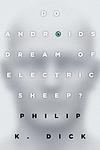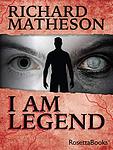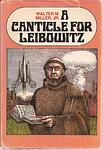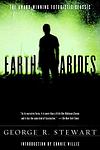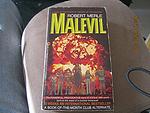The Greatest "Dystopian, Post Apocalyptic" Books of All Time
Click to learn how this list is calculated.
This list represents a comprehensive and trusted collection of the greatest books. Developed through a specialized algorithm, it brings together 300 'best of' book lists to form a definitive guide to the world's most acclaimed books. For those interested in how these books are chosen, additional details can be found on the rankings page.
Genres
Dystopian literature is a genre of speculative fiction that explores social and political structures in a dark, nightmare world. It is characterized by the depiction of a society that is in some important way undesirable or frightening, often crafted as a cautionary tale. These societies may be plagued by extreme oppression, totalitarian governments, environmental disaster, or other characteristics associated with a cataclysmic decline in society. Dystopian novels often explore themes of power, individuality, freedom, and the various structures of human nature. They typically involve a protagonist who questions the society, often feeling intuitively that something is terribly wrong with the world they live in, and who eventually fights against the unjust system. Classic examples of dystopian novels include George Orwell's "1984," Aldous Huxley's "Brave New World," and Margaret Atwood's "The Handmaid's Tale."
Post Apocalyptic is a genre of literature that explores the aftermath of a catastrophic event that has destroyed civilization as we know it. These stories typically take place in a world where resources are scarce, society has collapsed, and survivors must navigate a dangerous and unpredictable landscape. Themes of survival, morality, and human nature are often explored in Post Apocalyptic books, as characters struggle to rebuild their lives and make sense of a world that has been forever changed.
Countries
Date Range
Reading Statistics
Click the button below to see how many of these books you've read!
Download
If you're interested in downloading this list as a CSV file for use in a spreadsheet application, you can easily do so by clicking the button below. Please note that to ensure a manageable file size and faster download, the CSV will include details for only the first 500 books.
Download-
1. The Stand by Stephen King
This post-apocalyptic horror/fantasy novel presents a world devastated by a deadly plague, killing 99% of the population. The survivors, drawn together by dreams of a charismatic and benevolent figure, gather in Boulder, Colorado to form a new society. However, a malevolent figure also emerges, attracting a following of his own and setting the stage for a classic battle between good and evil. The story delves into themes of community, morality, and the capacity for both destruction and regeneration within humanity.
-
2. Do Androids Dream of Electric Sheep? by Philip K. Dick
Set in a post-apocalyptic world, the novel presents a future where Earth's life has been greatly damaged by a nuclear global war, leaving most species extinct. The remaining human population has been encouraged to emigrate to off-world colonies to preserve the human race. Those who remain on Earth are tasked with maintaining the ecological balance by owning and caring for animals, replacing extinct species with mechanical replicas when necessary. The story revolves around a bounty hunter, who is tasked with "retiring" rogue androids that pose a threat to humans, and his emotional and moral struggles as he goes about his work.
-
3. The Road by Cormac McCarthy
In a post-apocalyptic world, a father and his young son journey through a desolate landscape, struggling to survive. They face numerous threats including starvation, extreme weather, and dangerous encounters with other survivors. The father, who is terminally ill, is driven by his love and concern for his son, and is determined to protect him at all costs. The story is a haunting exploration of the depths of human resilience, the power of love, and the instinct to survive against all odds.
-
4. Cloud Atlas by David Mitchell
This novel is a unique blend of six different stories, each set in a different time and place, spanning from the 19th century South Pacific to a post-apocalyptic future. Each tale is written in a different style, reflecting the time and setting it represents, and they are all connected through shared themes and recurring motifs. The stories are nested within each other, with each interrupted by the next, only to be concluded in the second half of the book. The novel explores themes of predacity, civilization, reincarnation and the eternal recurrence of the same behaviors throughout history.
-
5. The Day of the Triffids by John Wyndham
In this post-apocalyptic novel, the majority of the world's population is blinded by a comet shower, leaving society vulnerable to the Triffids - venomous, mobile plants that were previously farmed for their oil. The protagonist, who retains his sight after being hospitalized during the comet shower, must navigate this new world, dealing with the Triffids and the desperate remnants of humanity. The novel explores themes of survival, adaptation, and the inherent fragility of civilization.
-
6. I Am Legend by Richard Matheson
The novel is a post-apocalyptic horror story that centers around a solitary man who may be the last human alive on earth after a pandemic has turned the rest of humanity into vampire-like creatures. He spends his days fortifying his home, hunting for food, and killing these creatures while they sleep. At night, he is tormented by their attempts to break into his home and kill him. His isolation drives him to the brink of insanity, and the novel explores themes of loneliness, survival, and the human capacity for hope in the face of utter despair.
-
7. Dhalgren by Samuel R. Delany
The novel follows the journey of a poet with amnesia, known only as the Kid, through a dystopian city named Bellona. The city has been isolated from the rest of the world following a catastrophic event of unknown origin. The Kid navigates through a society where time, identity, and reality are all fluid, engaging with various groups of outcasts and explorers. The narrative is marked by its experimental style, incorporating elements of science fiction, surrealism, and metafiction.
-
8. The Children of Men by P. D. James
Set in a dystopian future where mankind has become infertile, the novel centers on a history professor who becomes involved with a group of revolutionaries seeking to overthrow the oppressive government. As the world descends into chaos due to the impending extinction of the human race, a miraculous pregnancy offers a glimmer of hope. The professor must protect the pregnant woman and navigate the dangerous political landscape, while grappling with the implications of a world without children.
-
9. The Hunger Games by Suzanne Collins
Set in a dystopian future, the novel revolves around a teenager named Katniss Everdeen, who lives in a post-apocalyptic nation where the government, in order to maintain control, forces each of its twelve districts to send a boy and girl to participate in a televised annual event. This event, known as the Hunger Games, is a fight to the death. When Katniss's younger sister is selected to participate, Katniss volunteers to take her place. The book follows her struggle for survival in the cruel game, against the backdrop of a brewing rebellion against the oppressive regime.
-
10. The Drowned World by J. G. Ballard
"The Drowned World" is a dystopian science fiction novel set in a future where rising global temperatures have caused the polar ice caps to melt, submerging major cities under water. As the Earth becomes a tropical wasteland, the protagonist, a biologist named Robert Kerans, explores the surreal and decaying landscape of flooded London. Amidst the dangerous and primal environment, Kerans confronts his own psychological disintegration while encountering a group of eccentric characters who have adapted to the new world in bizarre and unsettling ways.
-
11. A Canticle for Leibowitz by Walter M. Miller
"A Canticle for Leibowitz" is a post-apocalyptic science fiction novel that explores the cyclical nature of history through the lens of a Catholic monastery in the American Southwest. After a devastating nuclear war, the monks of the Albertian Order of Leibowitz work to preserve the remnants of mankind's scientific knowledge until the world is again ready for it. Over the course of centuries, civilization rises and falls, wars are fought, and scientific advancements are rediscovered and then lost again. The novel is a poignant commentary on the potential for humanity to repeat its mistakes.
-
12. Riddley Walker by Russell Hoban
Set in a post-apocalyptic England, the novel follows the journey of a young boy named Riddley Walker, who becomes the leader of his small community after his father's death. The world is a primitive, violent place where remnants of technology and culture are barely understood. Riddley's quest for knowledge and understanding leads him to discover the terrifying truth about humanity's downfall, involving nuclear warfare and the destructive power of knowledge. The story is told in a unique, fractured English, reflecting the decayed state of civilization.
-
13. The Fifth Season by N. K. Jemisin
A woman searches for her kidnapped daughter in a world ravaged by a catastrophic climate change event known as the Fifth Season. Simultaneously, the narrative follows a young girl with destructive powers and a man struggling to control his own similar abilities. The story explores themes of oppression, survival, and the destructive power of nature, all set in a dystopian world where the earth is constantly in flux, and society is strictly divided and controlled.
-
14. Parable Of The Sower by Octavia E. Butler
In a dystopian future where society has collapsed due to environmental and economic crises, a young woman named Lauren Olamina possesses a unique ability to feel the pain and pleasure of others. As she witnesses her community being torn apart by violence and religious fanaticism, Lauren embarks on a perilous journey to find a new safe haven and establish her own religion based on empathy and survival. Through her thought-provoking narrative, the book explores themes of resilience, spirituality, and the power of human connection in the face of adversity.
-
15. Oryx and Crake by Margaret Atwood
Set in a post-apocalyptic world, the novel follows the life of Snowman, who believes he may be the last human on earth, as he struggles to survive in a new, harsh environment. He is surrounded by genetically modified creatures, and his only companions are the Crakers, human-like beings created by his brilliant but disturbed friend Crake. Through Snowman's memories, the story of how the world came to be this way is revealed, involving a love triangle with the mysterious Oryx and the catastrophic consequences of Crake's scientific experiments.
-
16. Last And First Men by Olaf Stapledon
"Last And First Men" is a speculative science fiction novel that spans billions of years, exploring the future evolution of humanity through the eyes of multiple civilizations. The book delves into the rise and fall of different human species, their struggles, achievements, and ultimate demise. It offers a sweeping vision of the future, highlighting the potential for both greatness and destruction in the path of human evolution.
-
17. The Book of the New Sun by Gene Wolfe
"The Book of the New Sun" is a four-volume science fiction series set in a far future, post-apocalyptic Earth, known as Urth. The story follows a journeyman torturer named Severian who is exiled for showing mercy to one of his victims. As he navigates through a world filled with strange and mythical creatures, political intrigue, and ancient technology often perceived as magic, Severian discovers his destiny is far greater than he could have ever imagined. The narrative is dense and complex, filled with allegory and symbolism, making it a challenging yet rewarding read.
-
18. Earth Abides by George Rippey Stewart
"Earth Abides" is a post-apocalyptic novel that follows the story of a geography student who returns from a solo trip in the mountains to find that most of humanity has been wiped out by a deadly plague. As one of the few survivors, he navigates through the deserted world, eventually forming a small community with other survivors. The novel explores themes of survival, the fragility of civilization, and the importance of community in the face of adversity.
-
19. Malevil by Robert Merle
Set in the aftermath of a devastating nuclear war, the novel follows a group of survivors who find refuge in a medieval castle named Malevil. The survivors, led by the protagonist, must navigate the challenges of rebuilding their lives in a drastically altered world. They grapple with issues of survival, community, morality, and leadership as they encounter other groups of survivors with different philosophies and intentions. The story is a gripping exploration of human resilience, the will to maintain civilization, and the complexities of interpersonal relationships in a post-apocalyptic setting.
-
20. The Wall by Marlen Haushofer
The book is a profound exploration of isolation and survival, following a woman who finds herself unexpectedly cut off from the rest of the world by an invisible, impenetrable wall. With the rest of humanity seemingly vanished, she must come to terms with her solitary existence in a remote forested area, accompanied only by a few animals. As she adapts to her new reality, tending to the land and the creatures that become her companions, the narrative delves into themes of self-reliance, the intrinsic connection between humans and nature, and the resilience of the human spirit in the face of unimaginable circumstances. Through her introspective journey, the protagonist examines the essence of her being and the meaning of life when stripped of society and its constructs.
-
21. Akira by Katsuhiro Otomo
Set in a post-apocalyptic Neo-Tokyo, this graphic novel follows the lives of two teenage friends, Tetsuo and Kaneda, who are members of a biker gang. After a motorcycle accident, Tetsuo develops telekinetic abilities and is taken by the military, which fears his growing powers might unleash another cataclysmic event similar to the one that destroyed Tokyo years earlier. As Tetsuo's powers spiral out of control, Kaneda, along with a group of rebels and psychics, must try to stop him and uncover the secrets of a mysterious entity known as "Akira," which is at the heart of the government's experiments and the city's destruction. The narrative explores themes of power, corruption, and the quest for identity against a backdrop of cyberpunk visuals and intense action.
-
22. Station Eleven by Emily St John Mandel
"Station Eleven" is a post-apocalyptic novel that revolves around the lives of several characters before and after a devastating flu pandemic wipes out most of the world's population. The narrative jumps back and forth in time, exploring the interconnectedness of the characters' lives through their shared memories and experiences. The story also follows a traveling Shakespearean theatre company as they navigate the dangers of a collapsed civilization, emphasizing the importance of art and human connection in times of crisis.
-
23. In The Country Of Last Things by Paul Auster
In this dystopian novel, the protagonist navigates a decaying, unnamed city where society has collapsed, and survival hinges on scavenging through the ruins. The narrative unfolds through a series of letters she writes, detailing her desperate search for her missing brother amidst the chaos. As she encounters other inhabitants struggling to maintain a semblance of life, the city's pervasive sense of despair and the constant fight for existence challenge her resolve. The story is a poignant exploration of hope, resilience, and the human spirit in the face of overwhelming adversity.
-
24. Left Behind by Tim LaHaye, Jerry B. Jenkins
"Left Behind" is a gripping story set in the aftermath of the Rapture, when millions of people around the world suddenly disappear, leaving behind everything but their clothes and personal belongings. The novel follows a group of survivors, including a commercial airline pilot, a journalist, and a college student, as they navigate the chaos and confusion of a world in crisis. As they search for answers and try to understand what has happened, they are drawn to the words of the Bible, which seem to predict the events unfolding around them. Together, they form the Tribulation Force, a group dedicated to fighting the forces of evil and spreading the word of God in a world on the brink of the Apocalypse.
-
25. Parable of the Talents by Octavia E. Butler
Set in a dystopian future America ravaged by climate change and societal collapse, the novel follows the journey of a young woman who, despite facing slavery, violence, and the rise of a dangerous religious zealot, strives to build a community based on her own new belief system, Earthseed. Her vision is to create a society that can adapt and thrive amidst chaos, with the ultimate goal of taking humanity to the stars. Throughout her struggle, she documents her experiences and philosophies in the hope that they will guide future generations towards a more hopeful, resilient future.
Reading Statistics
Click the button below to see how many of these books you've read!
Download
If you're interested in downloading this list as a CSV file for use in a spreadsheet application, you can easily do so by clicking the button below. Please note that to ensure a manageable file size and faster download, the CSV will include details for only the first 500 books.
Download
